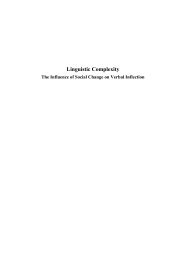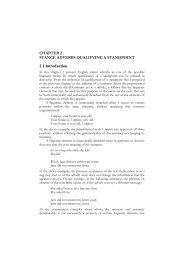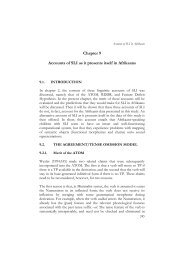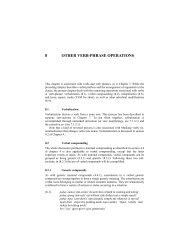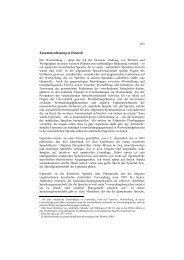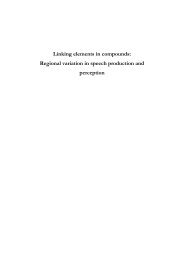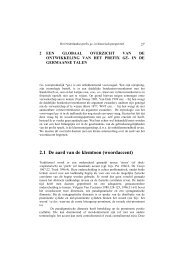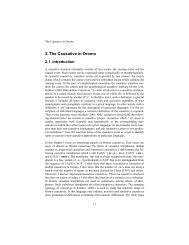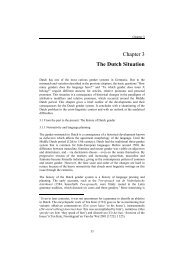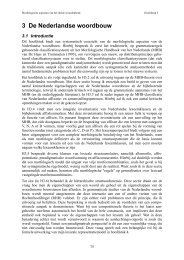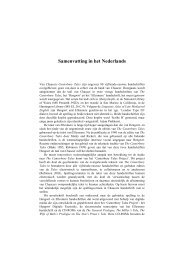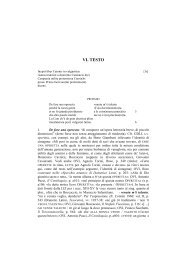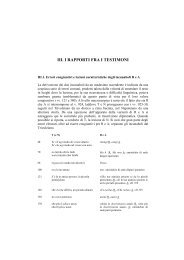Chapter 3 - LOT publications
Chapter 3 - LOT publications
Chapter 3 - LOT publications
Create successful ePaper yourself
Turn your PDF publications into a flip-book with our unique Google optimized e-Paper software.
68 Reduplicative coordination constructions<br />
It should be noted that ReCo examples can sometimes be a little clumsy. For instance,<br />
while an objectless ReCo construction is perfectly grammatical its counterpart<br />
with a direct object is sometimes less well-formed, but not outright ungrammatical. 8<br />
(55) a. John read and read<br />
‘John read (a book) but didn’t finish it’ [Durative, unbounded]<br />
*‘John read a book twice’ [Bounded]<br />
b. John read and read a book<br />
%‘John read a book but didn’t finish it’ [Durative, unbounded]<br />
‘John read a book twice’ [Bounded]<br />
Often, but not always, a ReCo construction with a definite object has a natural<br />
interpretation as a bounded predicate. For some speakers, this is most naturally interpreted<br />
iteratively (see also Rothstein 2004). The effect is ameliorated somewhat with<br />
indefinite objects. The reason for this is that verbs and direct objects are together construed<br />
as telic. Thus, the use of an object (and by corollary the extraction of an object)<br />
is relatively marked. Nevertheless, extractions of objects are grammatical as shown by<br />
examples like (54).<br />
It might be suggested that (54) is merely ATB extraction: in other words the subject<br />
is coindexed with two extraction sites, one in each conjunct. This would reduce ReCo<br />
to OCo. As has been demonstrated in section (2.1.1), ATB extractions cannot occur<br />
from pseudo-coordinative constructions. Consider the following examples illustrating<br />
extraction of benefactives.<br />
(56) a. The peasant kept trying to pump and pump and pump a glass of water for<br />
the soldier<br />
b. What did the peasant keep trying to pump and pump and pump for the<br />
soldier?<br />
c. Who did the peasant keep trying to pump and pump and pump a glass of<br />
water for?<br />
d. *Who did the peasant keep trying to pump for and pump for and pump<br />
for a glass of water for?<br />
Imagine a context in which a troop of soldiers walk through a rural village. A<br />
soldier might ask a peasant to pump some water from the well in order to drink it.<br />
Example (56a) is the basic example. (56b,c) show that both the direct and beneficiary<br />
objects can be extracted, the latter optionally stranding the preposition. The stranding<br />
of the preposition in final position marks the extraction site and thus (56d) illustrates<br />
that ATB extraction is not possible.<br />
In conclusion, extraction of arguments from ReCo is possible without recourse to<br />
ATB movement. Such extractions constitute exceptions to the CSC and are indicative<br />
that ReCo is a pseudo-coordinative structure.<br />
8 Some speakers are able to distinguish a slightly clumsy durative reading, even with a definite, direct<br />
object. For other speakers, a direct object always implies boundedness of the predicate and thus immediately<br />
triggers a serial reading.



